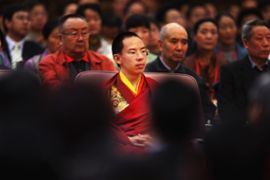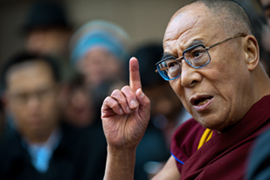Panchen Lama gains political role
China’s choice for leading Tibetan spiritual figure joins top legislative body.

It serves in an advisory capacity to the National People’s Congress, China’s largely ceremonial legislature.
The Panchen Lama, whose name is Gyaltsen Norbu, was appointed by Chinese authorities in 1995 over a boy chosen by the Dalai Lama, the exiled Tibetan spiritual leader.
Gyaltsen Norbu is emerging as Beijing’s choice to supplant the Dalai Lama as the public face of Tibetan Buddhism and has taken on an increasingly political role in recent years.
‘Ethnic unity’
He has made appearances with Communist Party leaders and publicly praised Chinese rule in Tibet.
 |
| The Dalai Lama chose another Panchen Lama, but he and his family have disappeared [AFP] |
Early last month state media reported that he had been voted vice president of China’s Buddhist Association, the state-run body that oversees the religion.
Speaking at the closing ceremony of the body’s annual conference at the beginning of February, he said he would “uphold the leadership of the Communist Party of China… adhere to socialism, safeguard national unification, strengthen ethnic unity and expand Buddhist exchanges, on the basis of adherence to the law and love for the nation and Buddhism.”
Despite Beijing’s backing, Gyaltsen Norbu is not widely accepted by Tibetans as the Panchen Lama, a figure that has traditionally advised and worked with the Dalai Lama.
Another boy, Gendun Choekyi Nyima, was named as the reincarnation of the Panchen Lama by the Dalai Lama in 1995.
The boy and his family, who are from a remote part of Chinese-controlled Tibet, disappeared soon after and have not been heard from since.
In recent years, Beijing has begun enlisting its chosen Panchen Lama in its campaign to criticise the activities of the Dalai Lama, who fled to India in 1959 and is portrayed by Beijing as a separatist.
China claims Tibet has been part of its territory for centuries, although many Tibetans say they were independent for most of that time.